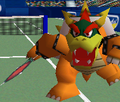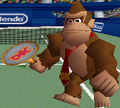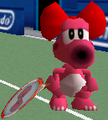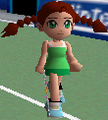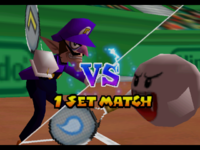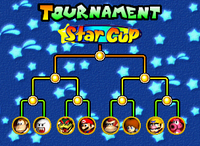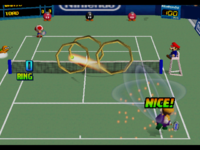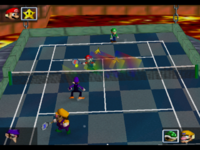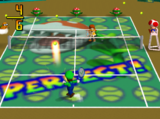Mario Tennis (Nintendo 64): Difference between revisions
No edit summary |
Cwjakesteel (talk | contribs) (→Power-ups: the banana can be volleyed, and does not even have to touch the ground untill the winning shot.) |
||
| Line 193: | Line 193: | ||
====Power-ups==== | ====Power-ups==== | ||
*'''Banana Peel:''' When the player implement this power-up, a banana peel gets attached to the ball and is deposited on the court when the ball touches down. This puts a potential slipping spot on the court, forcing the players opponent to play around the peel, lest they slip and fall. | *'''Banana Peel:''' When the player implement this power-up, a banana peel gets attached to the ball and is deposited on the court when the ball touches down. This puts a potential slipping spot on the court, forcing the players opponent to play around the peel, lest they slip and fall. However, if the ball does not hit the ground, but is volleyed, the banana has the potential to be deposited on the other side of the court. | ||
*'''Mushroom:''' Grabbing one of these mushrooms shifts the character into overdrive. | *'''Mushroom:''' Grabbing one of these mushrooms shifts the character into overdrive. | ||
*'''Lightning Bolt:''' When used, a bolt of lightning strikes the opponent, rendering them temporarily dazed. | *'''Lightning Bolt:''' When used, a bolt of lightning strikes the opponent, rendering them temporarily dazed. | ||
Revision as of 14:44, August 13, 2010
Template:Articleabout Template:Infobox Mario Tennis is a Nintendo 64 video game. It features Mario and his friends playing tennis. It was originally going to be called Mario's Dream Tennis, but was changed for unknown reasons. This game marked the debut of Waluigi, and also Princess Daisy and Birdo's re-entries into the Mario series. The Game Boy Color counterpart is Transfer Pak compatible with Mario Tennis.
Intro
The game begins with the launch of the Mario Star Tournament. Mario and a prominent cast of characters walk out onto the field, where it switches to a walk-through of more playable characters, and a quick zoom in on two shadowed figures. Eventually, the tournament is started and characters are matched up. Mario defeats DK, Yoshi beats Daisy, Peach beats Birdo, and Luigi beats Paratroopa. In the semi-finals, Mario beats Yoshi and Luigi beats Peach.
The finals start with Mario and Luigi beginning their match by looking for the tennis ball, when suddenly Wario and his new side-kick Waluigi bust in to challenge them. As Waluigi enjoys his new introduction, Luigi exclaims he's not afraid of this new character. Waluigi, angered challenges Luigi. Mario tries to calm the two down when Wario confronts him. The four are about to have-it-out, when a gloaming spot-light shines down upon them.
As Toad (who is the announcer) points and shouts, "What's-that!?", Bowser and the hovering Boo fall onto the court below knocking Wario and Waluigi backwards. Everyone appears disgusted that Bowser would try to ruin a tennis match. To everyone's surprise, the pair announce they have come to play a friendly game of tennis. As everyone is baffled, Mario breaks the silence by exclaiming, "Let's all play!". As Peach and Daisy look to each other and agree, everyone, including Wario and Waluigi, follow suit. Out of nowhere, a bob-omb makes its way onto the field. Without time to act, everyone is caught in the blast, and the game begins.
Characters
Participants
All-Around
Technique
Shy Guy (Unlockable)
Power
Donkey Kong Jr. (Unlockable)
Speed
Tricky
Varies
Non-Playable Characters
Basics
Serving
A serve begins each point in tennis. A single player serves each game, and players alternate serving throughout the course of the match. If the player wishes to serve, he/she must press either A or B, then A or B again plus a direction on the control stick to execute the serve. The right timing can result in a "Nice" serve, which is a bit more powerful and a lot quicker than a normal serve.
There are basically three choices when serving: serving normal, serving wide, or serving up the middle. Serves are their special shot counterparts. Therefore, if the player double-taps the A button when serving, they'll give up a Top Spin shot to open things. Double-tapping B on the serve serves a Slice. Holding A and B produces the biggest serve of the game: the Smash serve.
Top Spin
A basic, run-of-the-mill shot in Mario Tennis is the Top Spin shot. This shot has a higher arch to it, curving into the ground after it crosses the net. The player must hit a Top Spin shot by pressing A and aiming with the analog stick. A tail is added to a Top Spin shot by the player double tapping the A button. This will make the shot a bit more powerful and add an orange fire trail(tail) behind it.
Slice
A Slice shot has a lower trajectory and less of a bounce off the surface of the court. The Slice shot is performed by the player pressing B and aiming with the control stick. The player charges their slice shot by double tapping the B button. When they do this, a light blue trail(tail) will appear after the ball.
Lob
The player can lob a shot over an opponents head by tapping A, then B. The player can aim with the control stick to bury a lob in the back court. The Lob is especially effective against weaker, quicker players who come to the net.
Drop Shot
The player taps B, then A to hit a soft shot that barely clears the tape and "drops" a few feet from the tape. If an opponent is deep on the back court when the player performs the maneuver, they will have to sprint forward to make a play on the ball, which often leads to net balls.
Smash Shot
To do a Power Shot, the player must press A and B simultaneously. This will send a high-powered blast from the character's racket. The Power Shot is the toughest in the game to return. A Smash Shot is especially effective when used at the net. Often, a ball will be returned weakly. When this happens, a star will appear where the ball will bounce. A Smash Shot is indicated by a glowing pink trail(tail).
Charge
The player must press and hold either A or B. The player's character will freeze in place and begin to spark, indicating that power-up has begun. Let go of the button to hit the shot. A charge-up shot is not only more powerful, but easier to control as well. Once the player begins a charge-up, they will not be able to move until they hit the ball unless they are a "Tricky" character. It is possible to cancel charging if they misaligned the shot. The player does this by tapping Z in the midst of his/her charge-up. Charged shots result in devastating strength and are hard to return if performed correctly.
Mis-hits
Mis-hitting the ball usually occurs when the player's character doesn't have an optimal approach. Shots fly past the end line, miss wide and fade before reaching the net. Mis-hits usually occur when the player is moving toward the net. A common mis-hit is to dribble a ball off of the player's racket after a Slice shot. This happens when they are attempting to Smash a Slice shot on the return. If the player gets hit by the ball, the other team will get a point.
Baseline
From the baseline, the player can boom huge ground strokes and work the entire court. Playing the baseline also allows the player to track down anything the other player throws their way. The baseline works well for slow players (DK, for example) and those with excellent returns (Wario and Bowser).
Net
It is best used by quicker players who have a lot of reach. When at the net, the player can stay near the center, but must be ready to move laterally to track down shots that try to get by the player down the sidelines. The player must angle shots to the opposite side of the court their opponent is on.
Doubles
Doubles is a much different mode than singles. In fact, in most cases, it is much easier. The court is split into front and back sections. When the player's serving, it is their responsibility to cover the back. When they are not serving, they get to play the net. When being served to, the player's position will alternate. If the player is receiving the serve, they will play back on the point. If not, they've got the net.
Modes
In addition to the straight tennis matches offered in Mario Tennis, several special play modes are also available which are playable both individually or with a Mario party.
Exhibition
When the player selects Exhibition, the first choice he/she'll have to make is Singles or Doubles. If Singles is chosen, the next thing determined is how many games to play. If Doubles is selected, player's teammate and his/her skill level need to be determined. Easy, Normal, Hard, and Intense difficulties are the possible difficulties. Easy is similar to a first round opponent in the Mushroom Cup. Intense is the level of play the player encounters in the finals of the Star Cup.
Blue
- 1 Set: Play one set of two games.
- 3 Sets: Play three sets of two games each. This mimics the final round of the Star Cup tournament.
- 5 Sets: Play five sets of two games each.
Green
- 1 Set: Play one set of six games.
- 3 Sets: Play three sets of six games each.
- 5 Sets: Play five sets of six games each.
Once the player has selected the number of games he/she likes to play, an opponent is determined, if playing a one-player contest. The difficulty of the opponent can be adjusted too.
After the player's foe has been determined, the player must select a court to compete on. If the player has unlocked any of the special courts, the courts are displayed here.
Tournament
Mushroom Cup
The first tournament in the game, the Mushroom Cup is purely beginner. The players opponents are slow and relatively unskilled. The Mushroom Cup takes place on the hard court.
- First Round: 1 Set Match
- Second Round: 1 Set Match
- Final Round: 3 Set Match
Flower Cup
Held on a clay court, the Flower Cup showcases more talent than the player faced in the Mushroom. Players have picked up the pace and are much more skilled than the first round of those the player faced. However, they are still not at 100%.
- First Round: 1 Set Match
- Second Round: 1 Set Match
- Final Round: 3 Set Match
Star Cup
The Star Cup is the premier competition of Mario Tennis. The entire crew brings their best, most intense game to the court. The court surface is grass.
- First Round: 1 Set Match
- Second Round: 1 Set Match
- Final Round: 3 Set Match
Special Tournaments
There are three more tournaments available in Mario Tennis, but they need to be unlocked. To access the Rainbow, Moonlight and Planet Cups, the player needs to win the Star Cup in singles with all 16 characters. Once done, the player must "star" his/her character by pressing and holding the R shoulder button while selecting a player. This will allow the player to participate in the Rainbow Cup. The player has to beat the Rainbow Cup to get to the Moonlight Cup, and win the Moonlight Cup to get to the Planet Cup.
Rainbow Cup
One might expect the skill level of the Rainbow Cup to be higher, but it isn’t. The only significant difference between this and the Mushroom Cup is strength of serve. Players here deal a bit more power with their shots.
- First Round: 1 Set Match
- Second Round: 1 Set Match
- Final Round: 3 Set Match
Moonlight Cup
The Moonlight Cup is a lot like the Flower Cup, except in number of games played. Held on a clay surface, the Moonlight Cup’s second round is a 3 Set Match, and it's final round is a 5 Set contest.
- First Round: 1 Set Match
- Second Round: 3 Set Match
- Final Round: 5 Set Match
Planet Cup
The competition level is the same as that of the Star Cup, except here there’s more of it. Every match leading to the final is a three set endeavor. The final match is a grueling five sets. The Planet Cup takes place on a grass court, like the Star Cup.
- First Round: 3 Set Match
- Second Round: 3 Set Match
- Final Round: 5 Set Match
Ring Shot
The Ring Shot Challenges invites the player to compete in several contests to see how many rings they can collect in various matches of skill. In all except the Game mode, the challenge works like a tie break. The player serves first, then their opponent serves twice, then the player serve twice, and so on. Three rings appear on the court at a time. Each time the player collects one, another one will reappear on the court. As the player progress through the Ring Shot challenges, they'll receive a number of the same opponents appearing. Probable opponents have been noted for each stage of the four challenges.
- Game: In Game mode of the ring challenge, the player must collect Rings by playing against an opponent. The player must collect all the rings without winning or losing against their opponent.
- Time: The rules are simple. The player must get the required amount of rings in the time specified to clear each challenge. Even if the player misses a ball, they'll get to serve, or be served to again.
- Ball: Keeping the ball in play is the key here, as there is no time limit. Except for the final Bowser stage, the player will have five balls to work with to get the required score. Fault serves do not count as balls.
- Points: The object of this challenge is to get the required number of points before the time expires. In this stage, rings grow from small to very large. The smallest ones are worth the most, while the biggest are worth almost nothing.
Bowser Stage
Bowser Stage takes place on a floating court suspended by chains above a lake of lava. This game is a nod to Mario Kart, where the player can collect and use power-ups against the player's opponent. The court pitches and shifts throughout the match, and the player will have to contend with the weird gravity as a result. Running up it will take the player more time, and the down slope will pull them down toward the lava. The ball also reacts differently to the surface angle. The other major difference between this and normal tennis are the power-ups that are collected and used. They hover near the center of the net in glowing cubes (as seen in Kart) and become the players when they send a ball through one. The power-up then appears in the corner of the screen and can be used by pressing the Right shoulder button.
Power-ups
- Banana Peel: When the player implement this power-up, a banana peel gets attached to the ball and is deposited on the court when the ball touches down. This puts a potential slipping spot on the court, forcing the players opponent to play around the peel, lest they slip and fall. However, if the ball does not hit the ground, but is volleyed, the banana has the potential to be deposited on the other side of the court.
- Mushroom: Grabbing one of these mushrooms shifts the character into overdrive.
- Lightning Bolt: When used, a bolt of lightning strikes the opponent, rendering them temporarily dazed.
- Star: Power is increased by the player grabbing a Star. The shots will gain extra force and be virtually impossible to return if well-placed. Other power-ups can be juiced up on the Star.
- Koopa Shell (Green): The next shot after using this power-up will be accompanied by a trio of turtle shells, which will temporarily stun the opponent.
- Koopa Shell (Red): This power-up sends out a homing shell that seeks out the opponent and knocks them senseless for a moment.
Piranha Challenge
The first thing to determine when selecting Piranha Challenge is what kind of court to play on. There are four choices: Hard, Clay, Grass or Composition. The Piranha Challenge pits the player against four opponents: one Mario team player and three Piranha plants. The three plants spit balls randomly, and the object is to return them past the net camper and out of play. There are fifty balls total. There is no pattern to how the balls come from the piranha plants. The Mario team player will stay pretty much in the center of the net. If the ball somehow does make its way to the center player, they will return it, and the player will have to play both the returned ball and another piranha plant offering.
Courts
Every court plays a bit differently. Each court can be selected for Exhibition matches once unlocked.
Starter Courts
| Name | Ball Speed | Bounce | Notes |
|---|---|---|---|
| Open Court | Normal | Normal | Only available during Special games. |
| Hard Court | Normal | Hard | The surface used in the Hard Court yields a higher bounce than other courts. |
| Clay Court | Slow | Weak | The clay court makes players move much more idly. |
| Grass Court | Fast | Weak | The grass court yields a lot of low, fast shots. |
| Composition Court | Fastest | Normal | Not available in any tournament, the composition court is a super-fast surface. |
Unlockable Courts
| Picture | Name | Ball Speed | Bounce | How to Unlock | Notes |
|---|---|---|---|---|---|
| File:Mariobroscourt.PNG | Mario Bros. Court | Fast | Weak | Win the Mushroom Cup with Mario. | The Mario Bros. Court has a picture of the famous plumbers emblazoned upon it. This surface slightly favors All Around players. |
| File:Yoshibabymariocourt.PNG | Baby Mario and Yoshi Court | Fastest | Weak | Win the Mushroom Cup with Yoshi. | The Baby Mario and Yoshi Court goes well with speedy players. |
| File:Wariowaluigicourt.PNG | Wario and Waluigi Court | Slow | Strongest | Win the Star Cup in doubles with Wario. | The ball is slow but bouncy. This benefits taller and quicker players. |
| File:DKcourt.PNG | Donkey Kong Court | Fast | Strongest | Win the Mushroom Cup with Donkey Kong. | The court has a super-quick ball and ultra-bouncy surface. This favors power players. |
| File:MarioandLuigicourt.PNG | Mario and Luigi Court | Fast | Normal | Win the Star Cup with Mario in doubles. | A zippy surface, the Mario and Luigi court is great for a fast-paced match among friends. Power and all-around players will thrive. |
| File:BirdoandYoshicourt.PNG | Birdo and Yoshi Court | Slow | Strong | Win the Star Cup with Birdo in doubles. | Slow but bouncy. This court favors tall and fast players. |
| File:Supermariocourt.jpg | Super Mario Court | Normal | Strong | Win round three of the GBC Mario Tennis mini-game, Boo Blast. Then transfer the data through a Transfer Pack. | A court in the sky that features a picture of Mario. (Uses same background as Mario Bros. court) |
| File:Peachcourt.jpg | Peach Court | Normal | Normal | Win round three of the GBC Mario Tennis mini-game, Perfect Shot. Then transfer the data through a Transfer Pack. | A secret court built inside Peach's Castle. (Uses same background as Mario & Luigi court) |
| File:Yoshicourt.jpg | Yoshi Court | Fast | Strong | Win round three of the GBC Mario Tennis mini-game, Fruit Fantasy. Then transfer the data through a Transfer Pack. | A court located on Yoshi's Island. (Uses same background as Baby Mario & Yoshi court) |
| File:Wariocourt.jpg | Wario Court | Slow | Weak | Win round three of the GBC Mario Tennis mini-game, Treasure Box. Then transfer the data through a Transfer Pack. | Wario built this mysterious court. (Uses same background as Wario & Waluigi court) |
| File:Waluigicourt.jpg | Waluigi Court | Fastest | Strongest | Win round three of the GBC Mario Tennis mini-game, Medallion Match. Then transfer the data through a Transfer Pack. | Waluigi customized this court himself. (Uses same background as Wario & Waluigi court) |
| File:Bowsercourt.jpg | Bowser Court | Normal | Strong | Win round three of the GBC Mario Tennis mini-game, Two-on-One. Then transfer the data through a Transfer Pack. | A court built on the shadowy world of secret courts. |
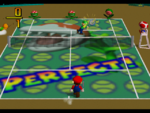
|
Piranha Court | Normal | Normal | Get a perfect score of 50 on the Piranha Challenge. | Only available in the Piranha Challenge. |
Staff
- Main article: Mario Tennis (Nintendo 64) Staff
Trivia
- If Mario is in a match, a clone of Mario dressed in blue clothing sits in the judge's seat. Mario will appear as the judge in matches not featuring him.
- This is the most current game to feature Donkey Kong Jr. as a playable character.
- The music that is played on the Wario and Waluigi court is a remix of the overworld theme in Wario Land 3 for the Game Boy Color.
- One of Donkey Kong Jr.'s alternate color schemes makes him look identical to the Pink Donkey Kong Jr. that appears in Donkey Kong Jr. Math.
- No matter what the player names Alex, Nina, Harry, and Kate, they will be called "Guest" by the announcer.
Image Gallery
External Links
| Nintendo 64 games | ||
|---|---|---|
| Super Mario franchise | Super Mario 64 (1996) • Mario Kart 64 (1996) • Mario no Photopi (1998) • Mario Party (1998) • Mario Golf (1999) • Mario Artist: Paint Studio* (1999) • Mario Party 2 (1999) • Mario Artist: Talent Studio* (2000) • Mario Artist: Communication Kit* (2000) • Mario Tennis (2000) • Paper Mario (2000) • Mario Artist: Polygon Studio* (2000) • Mario Party 3 (2000) • Dr. Mario 64 (2001) | |
| Donkey Kong franchise | Diddy Kong Racing (1997) • Donkey Kong 64 (1999) | |
| Yoshi franchise | Yoshi's Story (1997) | |
| Crossovers | Super Smash Bros. (1999) | |








